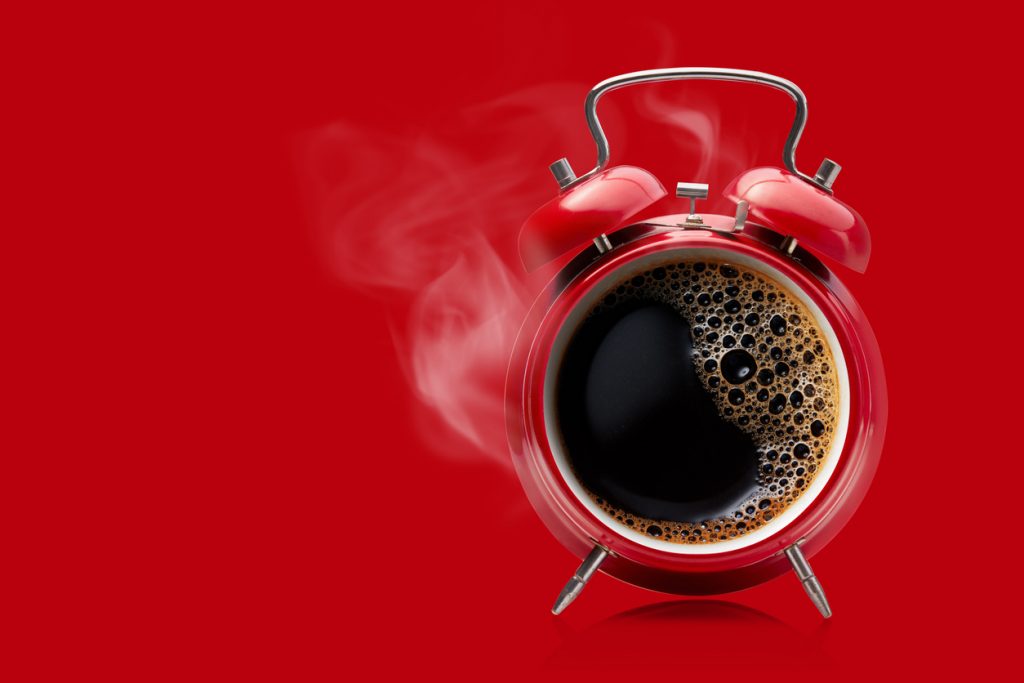Your alarm goes off. Time to start the day. And time for coffee! However, first-thing-when-you-wake-up isn’t the best time for you to have caffeine.
Wait At Least An Hour (Or More)
Cortisol, the “stress hormone,” regulates metabolism, immune response, and blood pressure and makes you feel alert and focused—it’s secreted by your adrenal gland when you’re stressed, but it’s also produced at different times of the day as part of your body’s natural rhythms. Cortisol is at its peak about 30 to 45 minutes after you wake up and slowly declines as the day goes on. (This is the case no matter what time you rise on a particular day, whether it’s a wake-up-early-and-go kind of day or a sleep-in-and-get-up-late kind of day!)
For most people, the best time to drink coffee is believed to be between 9:30 to 11:30 a.m.
But . . . Why?
It may seem that the stimulant caffeine could work with and enhance your body’s cortisol production, but it’s been found that drinking coffee or energy drinks when your cortisol levels are the highest makes the caffeine less effective and may cause your body to develop a tolerance to caffeine. (Instead of adding to the natural cortisol energy hit, you’re replacing it with a caffeine one.) A lower tolerance means you’ll need more and more caffeine to feel the same effect. It’s also thought that caffeine from coffee can increase cortisol levels, and prolonged elevated levels of cortisol can negatively impact your immune system and cause health problems.
Try changing your morning routine: eat first, wait a bit, and then enjoy your morning coffee. You may find that your energy boost lasts longer.
What About Afternoon Coffee?
On average, people’s cortisol levels peak between 8:00 and 9:00 a.m., noon and 1:00 p.m., and 5:30 and 6:30 p.m. It’s suggested to drink coffee between these times to maximize the benefits and avoid developing a caffeine tolerance.
But it’s important to remember that a mid- to late-afternoon coffee can impact your ability to sleep that night. Caffeine has a half-life of six hours, and caffeine hinders the neurotransmitter adenosine, which helps you feel sleepy. (In other words, try to allow for at least six hours between your afternoon coffee and bedtime.) It’s recommended to stop consuming caffeinated drinks by 2:00 or 3:00 p.m. and to have no more than four cups of coffee per day.
A late-afternoon herbal tea or decaffeinated tea or coffee may satisfy your craving.
The Best Time For Coffee For . . . Working Out
Research finds that coffee 30 to 60 minutes before a workout can give you a boost, delaying exercise fatigue (the inability to exercise at a certain intensity) and enhancing muscle strength and power.
The Best Time For Coffee For . . . Losing Weight
Morning. Coffee can improve your metabolism rate, but for the fat-burning effects, just a cup or two—the black-coffee-with-a-dash-of-milk kind.
For more on this, check out: Can Drinking Caffeinated Coffee Help You Lose Weight?
Sources:
https://www.healthline.com/nutrition/best-time-to-drink-coffee
https://www.businessinsider.com/heres-the-best-times-of-the-day-to-drink-coffee-2017-8
https://greatist.com/eat/best-time-to-drink-coffee


Leave a Reply